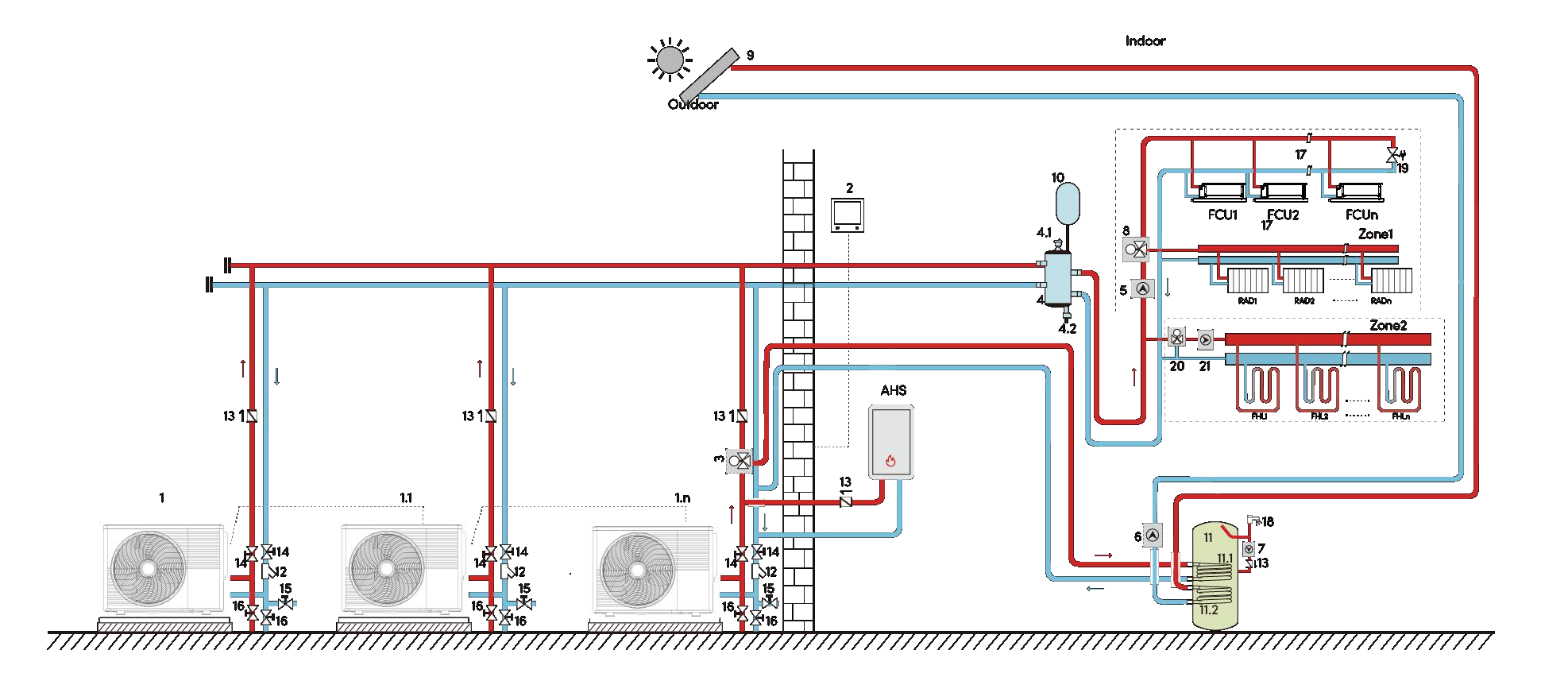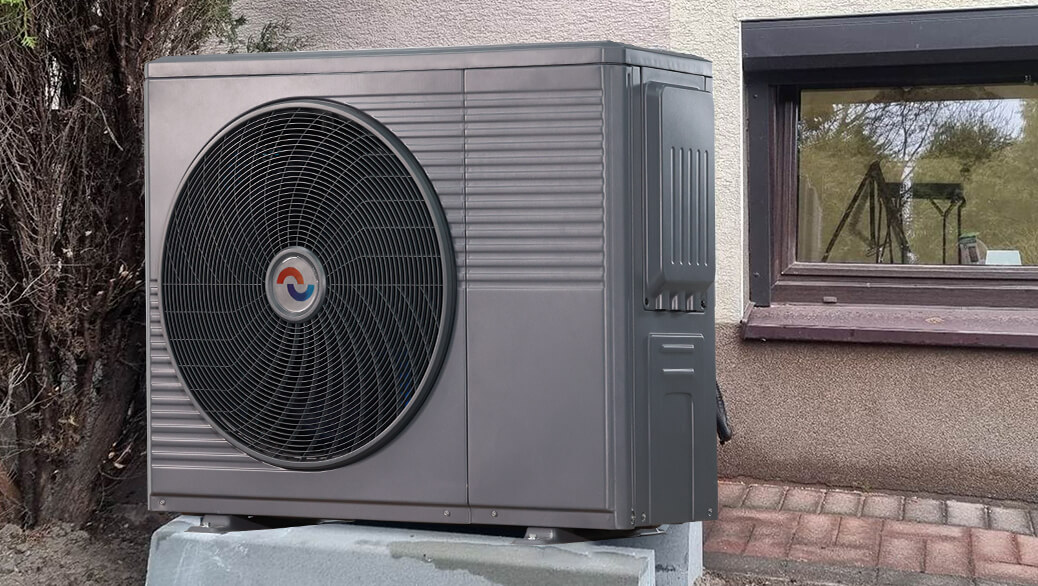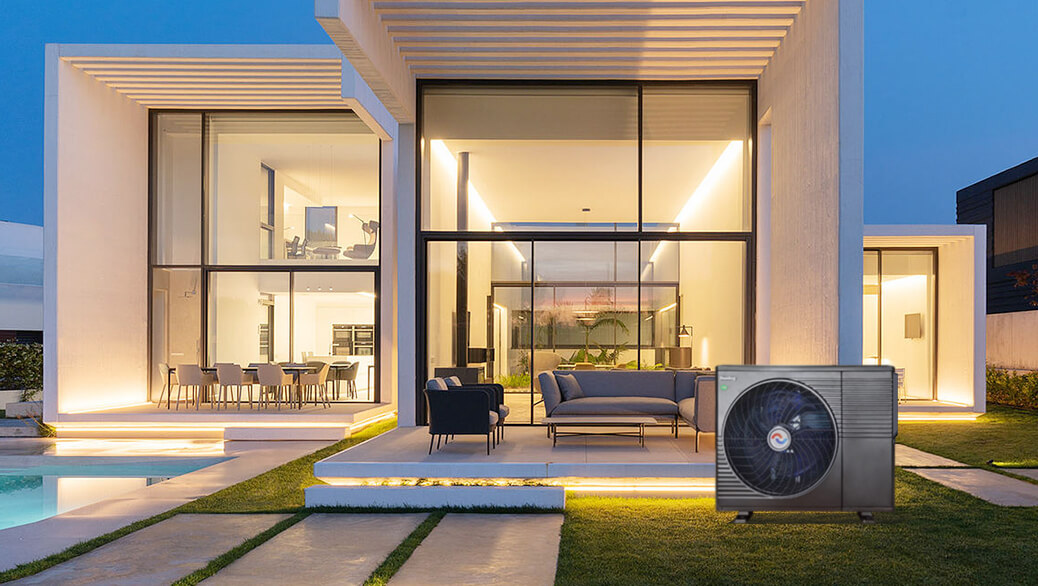
What is Air Source Heat Pump Cascade Systems?
As the demand for efficient and eco-friendly heating solutions grows, air source heat pumps have emerged as a reliable alternative for residential and commercial spaces.
Are Heat Pumps Expensive to Run? The Ultimate Guide to Cost Efficiency and Savings
Many households rely on water heaters for the production of hot water, but it is often overlooked that water heaters are among the least energy-efficient appliances in the home. Reports indicate that up to 18% of the electricity bill is attributed to the heating of water. Fortunately, there exists an energy-efficient alternative in the form of heat pump water heaters.
Unlike conventional water heaters that burn gas to heat water, heat pump water heaters utilize the existing heat in the air and transfer it to the water. This process avoids the inefficiencies associated with direct heat generation. For a comprehensive understanding of the functioning, advantages, disadvantages, and key considerations in selecting a suitable water heater for your home, we invite you to delve into our comprehensive guide.
Distinguished from traditional water heaters, heat pump water heaters employ electricity to facilitate the transfer of pre-existing heat from one location to another. Their versatility extends beyond water heating, as homeowners often employ heat pumps for both space heating and cooling. They can be deployed as standalone water heating systems or integrated into combination systems that offer both hot water supply and space conditioning. Additionally, they can be seamlessly integrated with existing heating systems and photovoltaic energy storage systems, allowing for enhanced energy management and efficiency. Many households may have a questions, that is, are heat pumps expensive to run? This guideline will give you some facts of running an air source heat pump water heater.
The price range for acquiring and setting up a heat pump water heater typically falls between $1,500 and $3,000. It is advisable to obtain multiple quotes in order to compare expenses, installation methods, and warranty offerings.
Here you can find more information about the costs of heat pumps:
How much does a cold climate heat pump cost? – http://www.spainceshi.cc/blog/how-much-does-a-cold-climate-heat-pump-cost/
Upgrade your home heating system with heat pumps – http://www.spainceshi.cc/blog/upgrade-your-home-heating-system-with-heat-pumps-benefits-costs-and-installation/

The working principle of a heat pump is similar to that of a refrigerator, with the main difference being that a refrigerator is used for cooling, while a heat pump is used for heating. In a refrigerator system, warm air inside is drawn over coils filled with refrigerant. The refrigerant absorbs heat from the air and is pumped by a compressor to the outside of the refrigerator (usually at the back), where the pressure causes it to evaporate and release heat back into the air. Continuing the cycle, the now cooler refrigerant condenses and returns to the inside of the refrigerator to start the process again.
The operation of a heat pump follows the same principle but in reverse. A fan pulls in warm air from wherever the heat pump is located (basement, utility room, or garage) and blows it over a series of coils filled with refrigerant called the evaporator coil. The slightly warmed refrigerant is then pumped by a compressor to increase the pressure and temperature and is then passed through a condenser coil that is either wrapped around the water tank or located inside it. The hot refrigerant transfers its heat to the water, which cools it down, and then returns to the evaporator coil, starting its journey again by collecting warm ambient air.
Heat pump water heaters must be installed in a location where the temperature is comfortably maintained between 40ºF and 90ºF throughout the year, as they won’t operate efficiently or at all otherwise. The good news is that these types of water heaters consume approximately one-third of the electricity used by standard water heaters because they harness existing heat.
The price of a heat pump might depend on the quality and brands of different components.
While we focused on heat pump water heaters in this article, it may be helpful to be aware of the different types of water heaters available for use.
Traditional storage tank water heaters: These have a large storage tank where water is periodically replenished and heated, available for use at any time during the day or night. These water heaters usually use electricity, natural gas, or propane to heat the water.
Tankless or on-demand water heaters: These do not have a storage tank and instead heat the water directly as it flows through the pipes to the shower or faucet. If sized appropriately for your home, you never have to worry about running out of hot water. However, if you have guests over, you may find that your on-demand water heater cannot keep up with the demand.
Solar water heaters: These utilize the heat from the sun to heat stored water. They can significantly save on the homeowner’s energy costs and have environmental benefits, but they have slower heating times and a much faster average rate of water consumption.
Heat pump water heaters: These collect surrounding heat from the air and compress it to heat the water. This method is more efficient and cost-effective compared to other methods. Hear pump hot water heater costs lower when operating in a long run.
One of the major issues with a heat pump water heater, sometimes referred to as a hybrid water heater, is the upfront cost. The price of a standard 50-gallon water heater can range from $500 to $1,000 (excluding installation costs), while the price of a heat pump water heater falls between $1,500 and $3,000. Fortunately, purchasing an Energy Star-rated heat pump water heater may make you eligible for nationally sponsored tax credits and federal tax incentives, potentially saving you hundreds of dollars.
After deducting the initial cost, a heat pump water heater can save you hundreds of dollars per year compared to traditional gas or electric water heaters. That is, although the average cost of heat pump water heater heat pump may be higher than other traditional heating machine, the running costs in the future are lower than other heating equipment.
Higher Efficiency: Heat pumps are more energy-efficient than standard water heaters because they don’t use energy to generate new heat. Instead, they collect existing ambient heat and transfer it to the water. This efficiency can save you hundreds of dollars in energy costs annually.
Tax Incentives and Rebates: Between federal tax incentives and nationally sponsored sales rebates, energy-efficient heat pump water heaters can be more affordable than most homeowners expect. While the upfront costs are high, most homeowners recover the cost of the heat pump water heater within the first year.
Environmentally Friendly: Since heat pumps are more energy-efficient than traditional water heaters, they consume less electricity and/or natural gas, reducing greenhouse gas emissions. In fact, energystar.gov estimates that replacing all residential water heaters with heat pump water heaters could save $12 billion in costs and reduce greenhouse gas emissions by up to 1.4 trillion pounds annually.
Ineffectiveness in Cold Climates: Heat pump water heaters draw surrounding heat from the air, making them unable to function properly, or sometimes not at all, in colder temperatures. Therefore, heat pump water heaters may be challenging to use in certain regions. Some heat pump water heaters use hybrid systems that can switch to a traditional electric water heater if the weather is too cold for the heat pump to operate.
Higher Upfront Costs: The biggest issue with heat pump water heaters is their higher initial purchase cost. The prices of these water heaters range from $1,500 to $3,000, significantly higher compared to the $500 to $1,000 range of traditional water heaters. While using a heat pump water heater may save more over time, the initial price may exceed the budget of some homeowners.
Here you can find more information about the advantages of air source heat pumps:
What are the advantages of a heat pump system – http://www.spainceshi.cc/blog/what-are-the-advantages-of-a-heat-pump-system/
Before buying a heat pump water heater for your home, consider a few factors that will help you determine which type of heat pump water heater to purchase or whether to buy one at all:
Size and First-Hour Rating: The size of the heat pump water heater and its first-hour rating can determine its practicality. The first-hour rating is the number of gallons of hot water the heater can supply per hour, starting from when the tank is full. Look for the EnergyGuide label on any new heat pump water heater to determine the first-hour rating and try to find a model that best matches your peak demand during specific hours. Peak demand refers to the busiest hour of water usage in your home.
You can estimate the peak demand by calculating the busiest water usage times in your home, such as when everyone wakes up and prepares for the day, and adding up the average water usage for each activity in gallons. You can find average gallon usage for each activity online, but keep in mind these are just estimates: showers use approximately 20 gallons, shaving uses around 2 gallons, a dishwasher uses approximately 7.5 gallons, and a washing machine uses approximately 15 to 25 gallons, depending on the model
Energy Efficiency: Once you have determined the power source and size required for your heat pump water heater, you will need to examine the available models for their energy efficiency to ensure cost savings and environmental protection. Each water heater should have an energy factor provided by the manufacturer, which is a measure of the amount of hot water produced per unit of fuel or power consumed in a typical day.
This number balances recovery efficiency and losses due to standby and cycling of water in the system. The higher the energy factor, the more efficient the water heater. However, keep in mind that to truly reduce operating costs, you also need to consider the fuel or power source you are using and its cost.
Cost: The final factor to consider when selecting a heat pump water heater for your home is, of course, the cost. You should compare not only the total cost of installation and equipment itself but also calculate your estimated unit operating cost to determine the best value. You can use the following equation to calculate your estimated operating cost:
365 days/year x 12.03 kWh/day ÷ EF (energy factor) x fuel cost ($/kWh) = annual operating cost
The 12.03 kWh/day represents the average energy usage per day based on the Department of Energy’s water heater test procedure for a three-person household. You can find the fuel cost on your utility bill to get an idea of the average level in your area, but as of June 2022, the national average in the United States was $0.154 per 1 kWh.
Now you know the answers of how much does a cold climate heat pump cost and does a heat pump cost more than an air conditioner. Whether you are in the market for a new electric water heater or facing high electricity bills due to an existing one, you may find yourself considering a switch to a heat pump water heater.
According to the Energy Star website of the U.S. Department of Energy, heat pump water heaters are more efficient than traditional electric water heaters and can save an average of up to $330 per year in electricity costs for an average household. Over the average lifespan of a heat pump water heater, this adds up to nearly $3,400 in savings.
The more people you have in your household, the faster these savings accumulate. Considering that a typical 50-gallon heat pump water heater costs around $1,200 compared to $300 for a traditional electric water heater, on average, you would pay off the price difference within three years and immediately start saving more on your water bills thereafter.
tags: {air source heat pump running cost calculator uk average cost of heat pump installed heat pump prices uk heat pump running cost calculator uk heat source pump cost uk how much does it cost to service a heat pump what is the cost of a heat pump water heater cost of hot water heat pump heat pump hot water cost heat pump water heaters cost heat pump.water heater cost heat pump hot water heater cost how much do heat pump water heaters cost cost of heat pump dryer cost of heat pump water heaters how much does a heat pump water heater cost cost of a heat pump water heater heat pump water heater cost cost of heat pump water heater how much do heat pumps cost in maine how much does a heat pump cost in maine how much does a heat pump service cost cost of electric heat pump vs gas furnace cold climate air source heat pump cost does a heat pump cost more than an air conditioner heat pump vs hvac cost heat pump service cost how much does a cold climate heat pump cost how much does a ductless heat pump cost heat pump water heater cost uk heat pump water heater cost per year heat pump water heater cost installed heat pump water heater cost vs gas heat pump water heater cost in india heat pump water heater cost canada heat pump water heater cost savings heat pump water heater cost to run commercial heat pump water heater cost how much does a heat pump water heater cost electric heat pump water heater cost rheem heat pump water heater cost 120 volt heat pump water heater cost hybrid heat pump water heater cost energy star heat pump water heater cost small heat pump water heater cost heat pump water heater costs heat pump water heater costco}</p >


As the demand for efficient and eco-friendly heating solutions grows, air source heat pumps have emerged as a reliable alternative for residential and commercial spaces.

On December 5th, 2023, the signing ceremony for the ‘Shenling Special Air Conditioning and Ventilation Equipment Manufacturing (Gaozhou) Project’ took place in Gaozhou, Maoming. Notable

Embracing the Sustainable Future with R290 Heat Pumps In recent years, the quest for sustainable and environmentally friendly solutions has led to significant advancements in